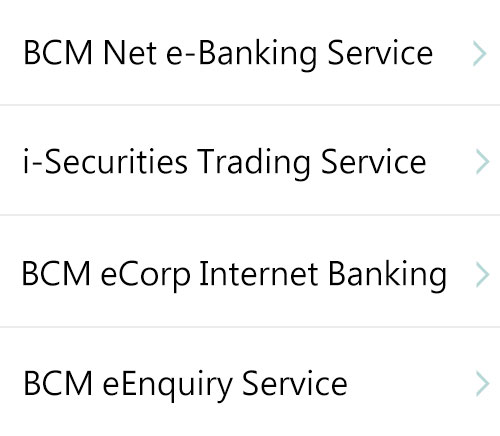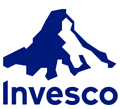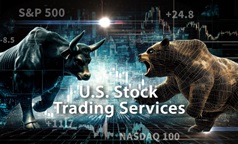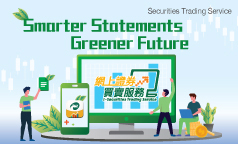

|
|
|

|


Investment Fund Service
Grasp Global Investment Opportunities
Product Features
Benefits of investment funds
Investment Fund Partners
Key Risks Warning
An investment fund is a type of collective investment scheme under which professional fund managers pool money from individual investors and manage it according to pre-set investment objectives. Investors can choose from an array of funds which invest in different asset classes and countries/regions to suit their investment objectives and levels of risk tolerance.
Access to global investment opportunities: Investment funds present you the opportunity to invest in a wide range of countries or sectors that suit your investment objectives.
Risk diversification: The nature of investment funds allows you to simultaneously invest in multiple securities or other financial products and enjoy the benefits of diversification.
Professional management: Investment funds are managed by professional fund managers who have deep understanding of the market and the access to latest research.
Affordable investment amount: Low investment amount enables you to achieve your investment goals at ease.
Minimum Investment Amount |
HKD10,000 or equivalent |
Note:
- For details, please contact our Branch Staff at the Investment Services Section.
- The information above is for your reference only, it does not constitute an offer of, or an invitation by or on behalf of BCM Bank to subscribe for or purchase any Investment funds or to enter into any transaction by any person, or a recommendation by BCM Bank to invest in any investment funds or enter into any transaction.
- If there is any discrepancy between the English and Chinese version, the Chinese version shall prevail.
The key risks associated with an investment in an investment fund are set out below. However, given the diverse range of investment funds offered in the market, the risk factors set out below are generic in nature and do not purport to disclose or discuss all of the risks associated with an investment in the particular fund for which you are subscribing. You should read the other risk factors set out in the offering document(s) for the relevant fund in order to understand the specific risks relating to the fund for which you are subscribing. If you are in doubt about the nature of or the risks associated with this investment product, you should obtain any necessary and appropriate professional advice before investing in this product.
Not Equivalent to Time Deposit – Investment funds are investment products and involve risks. It is not the same as nor should it be regarded as a substitute for traditional fixed deposit. Payment of dividends is not guaranteed.
Past Performance is No Guide to Future Performance – You should note that the price of the fund and any income or dividends generated from it may fall as well as rise and that you may not get back the full amount invested. Past performance is not a guide to future performance. The value of your investment may be substantially less than your original investment amount. In the worst case scenario, your investment could be worth nothing.
Currency Risk – You will be subject to currency risks where the currency of the fund differs from your home currency, or where the currency of the fund differs from the currencies of the markets in which the fund invests.
No Guarantee on Achieving Investment Objective – There is no guarantee that the investment objectives of the fund will be achieved.
Capital Growth Risk –The fund may have fees and/ or dividends paid out of capital, which may in turn reduce the capital available for investment in the future and capital growth.
A High Distribution Yield Does Not Imply a Positive or High Return on the Total Investment – The fund may reinvest its dividends rather than distributing the same to you. Moreover, the investment fund manager may have discretion on whether or not to make any distribution out of the income and/ or capital of the fund. You should note that investment in a fund with a high distribution yield does not imply a positive or high return on the total investment.
Investment Subject to Various Types of Risks – You will be subject to the social, political, tax, economic, foreign exchange, liquidity, legal and regulatory risks associated with the markets in which the fund invests and also be subject to risks associated with, including but not limited to, investing in derivative instruments, fluctuations of interest rate/exchange rate and creditability of issuers of instruments the fund investing in, which may adversely affect the fund’s performance.
For equity funds only – If the fund is an equity fund and it invests in emerging markets, a single market or sector or a limited number of geographical markets, sectors or smaller cap companies, the fund will be subject to higher degree of risk and are usually more sensitive to price movements.
For bond funds only – If the fund is a bond fund, its net asset value may decline or be negatively affected if there is a default of any of the bonds that it invests in or if interest rates change. If the fund invests in high-yield bonds, apart from the risks mentioned above, it will also be subject to higher credit risk since high-yield bonds are typically rated below investment grade or are unrated and thus, funds, which invest in high-yield bonds, are often subject to a higher risk of issuer default. Funds investing in high-yield bonds will also be more vulnerable to economic cycles; during economic downturns, high-yield bonds will typically fall more in value than investment grade bonds due to factors such as (i) investors become more risk averse and (ii) default risk rises. In addition, if the bond fund invests in the following types of debt securities, the fund will be subject to a higher degree of risk. These include: non-investment grade (or rated as ‘investment grade’ by a local credit rating agency whose rating process and standards may be significantly different from those adopted by internationally recognized credit rating agencies), unrated, emerging market, distressed, perpetual, subordinated, callable, extendable, convertible or exchangeable debt securities; defaulted debt securities; mortgage and asset-backed securities; debt securities with variable and/ or deferral of interest payment terms; debt securities with contingent write down or loss absorption feature; specialized debt securities; sovereign securities; and debt securities in a single market or sector or specific geographical markets or sectors.
For balanced funds only – If the fund is a balanced fund and invests in both bonds and equities, it will be exposed to risks of both bond fund and equity fund as described above.
For funds investing directly in China’s domestic securities markets through the Renminbi Qualified Foreign Institutional Investor (“RQFII”) regime only – The RQFII policy and rules are subject to change. The uncertainty and change of the laws and regulations in the PRC may adversely impact the fund and such changes may also have potential retrospective effect. There is no assurance that repatriation restrictions will not be imposed in the future. Any restrictions on repatriation of the invested capital and net profits may adversely affect the fund’s ability to meet your redemption requests. In the event of PRC broker/sub-custodian’s default in the execution/settlement of fund’s related transactions, the fund may encounter delays in recovering its assets which may in turn impact its asset value. The current PRC tax laws and regulations in respect of capital gains realised by RQFIIs on its investments in PRC are subject to change and may adversely affect the fund’s asset value. The concentration of fund’s investments in PRC related companies may result in greater volatility than portfolios which comprise broad-based global investments.
For RMB denominated funds only – RMB is currently not freely convertible and subject to exchange controls and restrictions. If you are an individual who needs to conduct RMB currency exchange, you are subject to a daily conversion limit (“Limit”) and should allow time for such conversion for amount exceeding the Limit.
Suitability – The investment decision is yours but you should not invest in the Investment Funds unless the intermediary who sells it to you has explained to you that the product is suitable for you having regard to your financial situation, investment experience and investment objectives.
Service Channels
User Guide
FAQ
- Customers may access Investment Fund Service through the following channels:
Please visit our branches (offering investment services) and meet with a dedicated Investment Services Relationship Manager.
Designated Branch:- Main
- Lacerda
- Iao Hon
- Pedro Coutinho
- Kin Wa
- Nape
- Palha
- Toi San
- Prince Flower City
- BCM Net E-banking Service
Login BCM Net → Online Fund Trading Services
- Customers may contact TeleBCM at 8796 8888 for assistance during office hours to subscribe or redeem funds.
User guide - Online Fund Trading Services
- What services does Online Fund Trading Servicesprovide?
Online Fund Trading Services provide the following services:
Fund Portfolio — View the details of funds you are holding
Fund Subscription — Subscribe funds with lump-sum transactions, and with subscription amounts as low as HKD10,000
Fund Redemption — Redeem Available Units in the selected Investment Fund Account
Fund Transaction History — View transactions made in up to the past 4 months
- Is the Online Fund Trading Services available 24 hours every day?
We provide Online Fund Trading Services 24 hours every day except during e-Banking Service maintenance.
- Can I transfer funds via Online Fund Trading Services?
The fund transfer service is not available in Online Fund Trading Services. If you wish to transfer funds to other organizations, please visit our branches.
Designated Branch:
Main
Lacerda
Iao Hon
Pedro Coutinho
Kin Wa
Nape
Palha
Toi San
Prince Flower City
- How can I access Online Fund Trading Services over the Internet?
If you have valid UT account(s) and corresponding settlement account(s) with us and have registered as BCM Net e-Banking Service, you can login to BCM Net e-Banking Service and enjoy Online Fund Trading Services.
- What should I do if the Online Fund Trading Services system is not responding?
You may contact TeleBCM at 8796 8888 for assistance or call your Relationship Manager during office hours to subscribe or redeem funds.
- Is there any special system requirement for using Online Fund Trading Services?
The system requirements of Online Fund Trading Services are the same as those of BCM Net e-Banking Service. Customers who can use BCM Net e-Banking Service should be able to use Online Fund Trading Services.
- How can I view my current fund holdings?
After logging in to BCM Net e-Banking Service, you can select "Online Fund Trading Services" > "Fund Portfolio" to view the details of your fund holdings.
- What do the items in "Fund Holdings" section mean?
Please refer to the following:
Item Remark PRR (Product Risk Rating) Product Risk Rating (PRR) is classified into 5 levels, ranging from Level 1 to Level 5 (with Level 5 as the highest risk level):Level 1, 2, 3, 4, 5 Holding Units The number of fund units you are holding in the selected investment fund account Available Units The number of redeemable fund units you are holding in the selected investment fund account Fund CCY The reporting currency of the fund Unit Price (Value Date) The reference market price and respective value date of the fund Market Value (HKD Equivalent) The reference market value of the fund in HKD equivalent is calculated based on Holding Units, Unit Price (Value Date) and the system reference exchange rate
- Why do "Subscribe" and "Redeem" appear in "Instruction" column for some, but not all, of the funds?
"Subscribe" - only appears for funds that allow subscription through Online Fund Trading Services. If a fund (1) is not available for subscription or (2) only allows subscription via branches, "Subscribe" button will not appear for that fund.
"Redeem" - only appears if the customer has available unit balance for the fund.
- Why are my fund holdings shown in "Fund Portfolio" section under Online Fund Trading Services different from those in "Account Portfolio" under "Balance & Transaction History" of e-Banking Service?
The fund holdings shown in Online Fund Trading Services are updated on a real time basis while those in BCM Net e-Banking Service are information from the previous working day. If you want to check the latest information of your fund holdings, please always refer to Online Fund Trading Services.
- I have submitted a fund subscription instruction. Why isn't the instruction shown in "Fund Holdings" section?
The instruction may not be processed yet. Please check if it appears under "Pending Fund Transactions" section under "Online Fund Trading Services" > "Transaction Record". If the instruction is not found, please contact TeleBCM at 8796 8888 for enquiry.
- How can I place fund subscription/redemption instructions?
After logging in to BCM Net e-Banking Service, select "Online Fund Trading Services". Then, select "Fund Subscription" if you want to place subscription instructions or select"Fund Redemption" if you want to place redemption instructions. If you use our "Fund 360" fund information platform to view and select funds, you can also subscribe funds through it. For details, please refer to our Online Fund Trading Services Demo.
- Can I place fund transaction instructions anytime?
Yes. You can place instructions anytime via BCM Net e-Banking Service. However, the instruction's execution time depends on the fund's dealing days and the time the instruction is received.
- Can I amend or cancel a fund transaction instruction?
You cannot amend or cancel any submitted instruction. Please verify the instruction details carefully before confirming the instruction.
- When will fund transaction instructions be processed if Black Rainstorm Warning Signal or Typhoon Signal No. 8 or above is in force?
Customer’s instructions will be processed after resume business.
- If Black Rainstorm Warning Signal is hoisted after 9 am of a dealing day, orders submitted will be processed on the same dealing day (apart from orders submitted after the cut-off time of a dealing day)?
It is because you have placed an instruction to redeem all units of the fund but the instruction is not yet settled.
- If Black Rainstorm Warning Signal is hoisted after 9 am of a dealing day, orders submitted will be processed on the same dealing day (apart from orders submitted after the cut-off time of a dealing day)?
If your instruction(s) appears in "Pending Fund Transactions" section under "Transaction Record", that means the instruction(s) is being processed. If your instruction(s) appears in "Past Transaction Record" section, the instruction(s) has been processed already.
- I have a settlement account. Why isn't it available for selection when I subscribe funds?
It may be because your settlement account does not support the settlement currency, e.g. buying a USD-denominated fund with a HKD settlement account. For enquiry, please contact TeleBCM at 8796 8888 for enquiry.
- I only have USD in my settlement account. Can I subscribe funds denominated in other currencies?
No. For subscription instructions, the fund currency must be same as the settlement currency. For example, if you subscribe a fund which the fund currency is USD, you need to have enough USD in your settlement account. If you do not have sufficient currency for fund subscription, you may conduct foreign exchange via our e-Banking service under the "Buy/Sell Foreign Currency" function.
- Can I trade more than 1 fund at the same time?
No. You can only subscribe or redeem 1 fund for each instruction.
- Why am I asked to conduct Online Risk Assessment when subscribing funds?
It may due to (1) you have not conducted Risk Assessment at our Bank or (2) your Risk Assessment has been expired. You can conduct Risk Assessment via BCM Net e-Banking Service or visit our branches.
- Will I receive any confirmation after the transaction?
Yes. After the transaction is executed, an "Order Confirmation Note" will be mailed to you.
- What do the items in "Fund Subscription" section mean?
Please refer to the following:
Item Remarks Investment Objective Investment Objective is defined as follows:
Capital Appreciation: Investment product that aims to generate potential capital gain.Income Focused: Investment product that aims to generate interest or income, which may be paid out or reinvested; and may be paid by regular intervals or in one lump sum on a specified day.Yield Enhancement: Non-principal protected structured product that aims to enhance return (such as gaining / reducing exposure to an underlying asset at a discount / premium to the spot price).Capital Preservation: Investment product with principal protection at the end of the investment periodNet Worth Net worth = Value of all assets (exclude real estate properties) – Value of all liabilities (exclude outstanding mortgage) Investment Experience Relevant investment experience in investment funds. Product Risk Rating Product Risk Rating (PRR) is classified into 5 levels, ranging from Level 1 to Level 5 (with Level 5 as the highest risk level):Level 1, 2, 3, 4, 5
- What is risk mismatch? Why will the fund subscription instruction be rejected when there is risk mismatch?
If your fund subscription instruction(s) involves risk mismatch, it may belong to 1 or more of the 4 situations below:- Investment Objective Mismatch: Your investment objective for this transaction is different from the product investment objective.
- Product Risk Mismatch: The Product Risk Rating is higher than your Risk Tolerance Level.
- Undue Concentration in a product: The amount to be invested in this transaction is equal to or more than 20% of your declared net worth; and/or the total amount invested in this type of product (including this transaction) is declared to be exceeded 50% of your total net worth.
- Investment Experience Mismatch: You have no relevant investment experience in Investment Fund.
- What are the differences between subscription via Online Fund Trading Services and subscription via branches?
Please refer to the followings:
Online Fund Trading Services Branches Service Hours 24 hours every day except during e-Banking Service maintenance Subject to branch opening hours Account Opening No Yes Joint Account Trading Only for either-to-sign joint accounts Both either-to-sign and both-to-sign joint accounts Investment Fund Savings Plan Subscription Not supported Supported Fund Switching Not supported Supported Fund Transfer-in / -out Not supported Supported
- How can I view my fund transaction record?
After logging in to e-Banking Service, you can select "Online Fund Trading Services" > "Fund Transaction History" to view the details of your pending fund transactions and past transaction record.
- What do the items in " Fund Transaction History" section mean?
Please refer to the followings:
Item Remarks Instruction Date / Trade Date Instruction date is the date you place the instruction via Online Fund Trading Services while trade date is the date in which the instruction is executed Type There are 7 types of fund transactions:
Subscription
Redemption
Transfer-in
Transfer-out
ReinvestmentCurrency The reporting currency of the fund Gross Amount The total amount involved in the transaction Unit Price The quoted fund unit price on the trade date
(Not applicable for pending fund transactions)Units The number of fund units involved in the transaction
- How long are my past transactions shown?
Transactions in up to the past 4 months are shown in "Fund Transaction History" section.
- I have submitted a fund transaction instruction a few days ago, but why does it still show in "Pending Fund Transactions" section?
We will execute your instruction according to the fund dealing days. If the instruction is still pending after the fund dealing days, please contact TeleBCM at 8796 8888 for enquiry.
- How can I obtain the offering documents of a fund?
When subscribing to a fund, you may select the “Offering Document” button on the relevant page to view and/or download the fund’s sales prospectus.
Related services and promotions
About Us Contact Us Job Vacancy Branch/Self-Service Banking Centre Network Site Map Internet Privacy Policy Statement and Disclaimer Supervised Authority Disclaimer: The Products / Services provided by BCM bank are not targeted at the customers in EU. This website is optimized for Internet 11+ / Google Chrome / Safari, and is best view with screen resolution 1024 x 768.。 © Copyright Banco Comercial de Macau,S.A. 2003 - 2019. All rights reserved. |


















